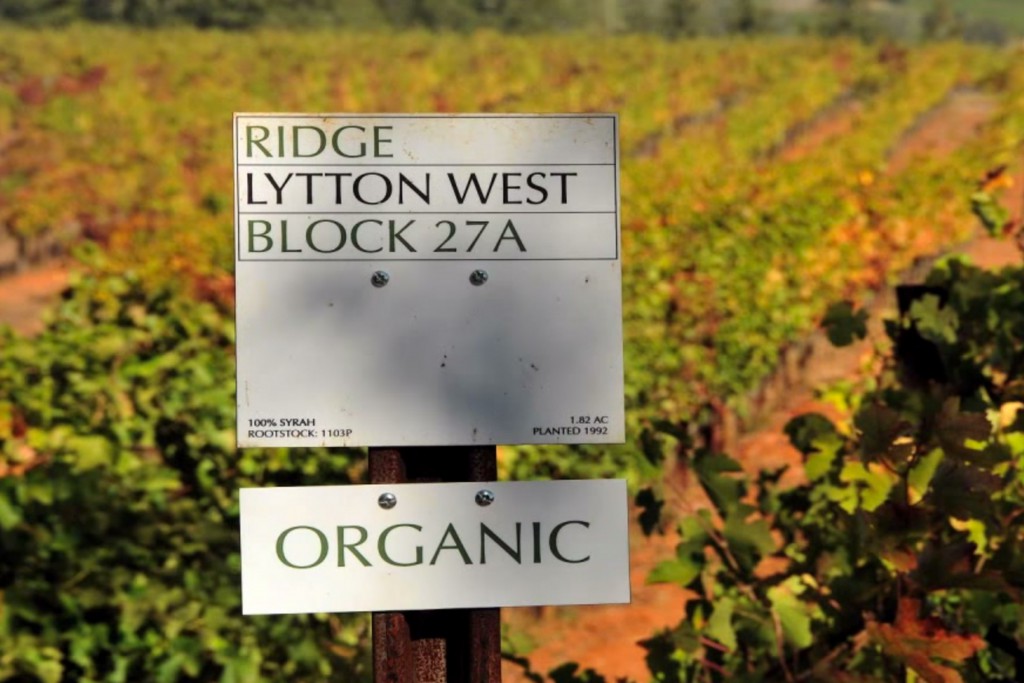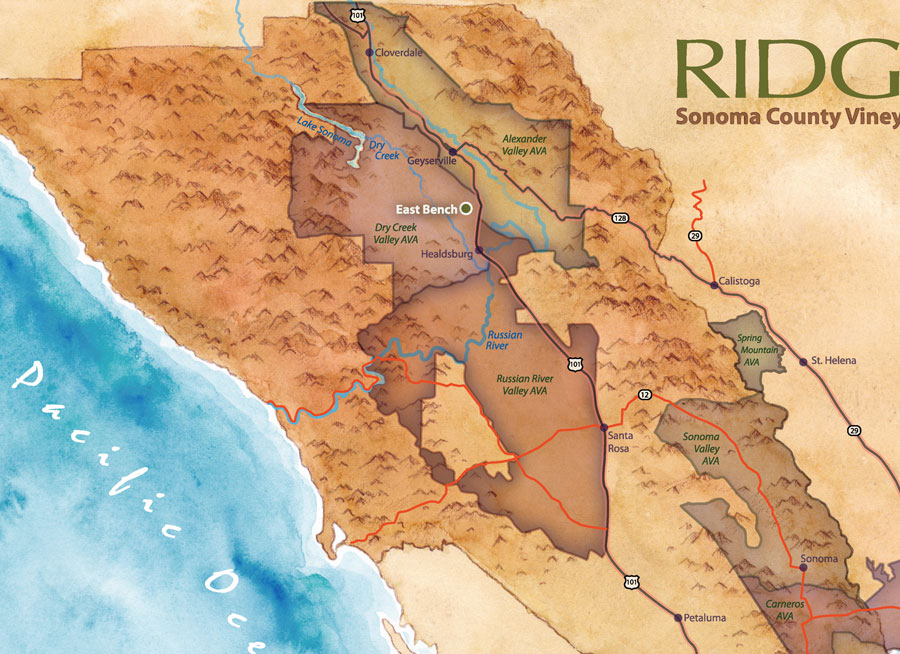How Many Acres of Organic Grapes Does Ridge Grow in Sonoma County?
Blog Post
In 2015, Ridge Vineyards completed certification on 195 acres of organic vines in Sonoma County. At the time, this was twice as much as any other grower in the county. These vineyard sites included:
- Lytton Estate West (Lytton Springs in Dry Creek Valley), 95.3 acres
- Lytton Estate East (Lytton Springs in Dry Creek Valley), 41.2 acres
- Whitton Ranch (Geyserville Vineyard site in Alexander Valley), 23.9 acres
- Fredson Ranch (Geyserville Vineyard site in Alexander Valley), 14.6 acres
- East Bench (an estate vineyard in Dry Creek Valley), 19.7 acres
And it’s not just our Sonoma Vineyards. As of January, 2020, 345 acres of vines at our Monte Bello, Lytton Springs, Geyserville, and East Bench vineyards are certified organic.

Sonoma Winegrowers and Sustainability
In 2014, the Sonoma County Winegrowers association announced that they are committed to becoming the first 100% sustainable wine region in the United States by 2019. Today, 99% of the vineyard acreage in Sonoma County has been certified sustainable by a third-party program, making Sonoma the most sustainable winegrowing region in the world. Here is a video put together by the Winegrowers discussing farming in Sonoma County:
So what are the differences between sustainable and organic farming?
Sustainable farming of grapes refers to practices that are not only ecologically sound, but also economically viable and socially responsible. Sustainable farmers may farm organically but it is not a requirement. Growers have the flexibility to choose what works best for their individual property. What is essential is small, realistic, and measurable steps as defined in the Code of Sustainable Winegrowing Practices Workbook as defined by the California Sustainable Winegrowing Alliance (CSWA).
To make the claim of Organically Grown Grapes requires a certification from an outside body and requires the following practices:
- No use of synthetic chemical inputs such as fertilizers, pesticides, or the growing of vines that have been genetically modified. Only organic treatments are allowed.
- The vineyard has to be free from prohibited chemical inputs for 3 years before certification can be granted.
- Detailed written records of all treatments done on the vineyard must be maintained (audit trail).
- The grower must undergo periodic inspections of the vineyard sites.
- Both Organic and Sustainable are important practices used by growers and wineries to ensure the integrity of the soil, the fruit and the environment.
Organic Vineyard Highlight: East Bench
“In 2000, Ridge was fortunate to procure a lease on property just above our Lytton Springs vineyard. This benchland was planted to grapes before Prohibition, but abandoned for the rest of the twentieth century, and used as pasture. We knew the soil well. Over the next two years, we planted the land to our four favorite zinfandel selections. By 2006, we knew we had a wonderful site for a stand-alone wine that could showcase pure Dry Creek Valley zinfandel; we labeled it ‘East Bench.’

“Ridge had been experimenting with organic grape-growing for several years prior to 2008, when we decided to phase in organic certification. The transition period for such certification in the U.S. is three years. The designated acreage is farmed organically, using only organic soil amendments, crop protectants, and fertilizers. At the end of three years, your organic certifying agent incorporates a site visit with a thorough review of crop-input records—coordinated with the California Department of Pesticide Regulations to make sure that only organic crop protectants were used. At the same time, you must register with the state the amount and type of organic acreage and crops. Once you pass inspection, (and pay fees to your certifying agent and the state) your grapes can be labeled as ‘organically grown.’ When you have received certification, the agent will inspect your ranches and records annually.
“East Bench was the first of our estate wines to be labeled as made with ‘organically (and sustainably) grown grapes.’ East Bench was our organic certification guinea pig: the vines are young, and come from a single small ranch with a single soil series, all on gentle, mostly-flat bench terrain. In short, it was chosen because it was easiest. Our Lytton Springs vineyards, on the other hand, comprise five different soil types in multiple blocks, including vines of widely varying age on varying terrain that includes flats, slopes, and hillsides.
“We have moved slowly and carefully in the quest to grow our grapes organically, and are now the largest organic grower in Sonoma County, and in the Santa Cruz Mountains. We have chosen organic certification so that our farming—free of conventional chemicals and additives—is as traditional as our winemaking.”
– David Gates, VP of Vineyard Operations
What’s Next for Ridge and Organic Farming?
At Ridge, we believe in the importance of being stewards of the land. Farming is a way of life and we want that to be healthy and safe for everyone involved including our staff and customers. We take pride in what we do and how we do it, we believe that comes through in the quality of our wine.
To read more on our interest in organic farming, visit these links:
Wait!
In order to qualify for user related discounts, you must log in before proceeding with checkout. Click the button below to log in and receive these benefits, or close the window to continue.
Log In